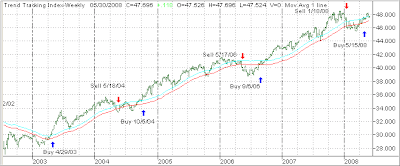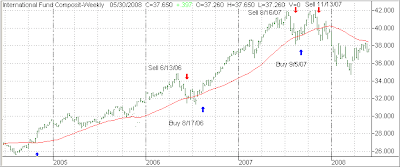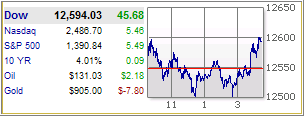 It’s been an ongoing battle of the minds for a long time whether fundamental or technical analysis will give you the edge when it comes to investing.
It’s been an ongoing battle of the minds for a long time whether fundamental or technical analysis will give you the edge when it comes to investing.
As you know from my writings, I am clearly in the technical camp, because I believe that fundamental factors are always represented in the price of a stock, commodity, ETF or mutual fund.
Reader Tim posed an interesting observation about his subject, which I wanted to share with you. Here’s what he said:
I’m a new recipient of your newsletter and I want to say I’m impressed by your philosophy, approach and viewpoints regarding ETFs and mutual fund markets. I’m not sure how to post to the blog, so I’m just emailing you.
I invest in these markets, using whatever skills I have, and it appears your newsletter will help a lot, maybe along with some of your other services.
I read your sort of optimistic posting re; today’s mkt. activity, and I have a couple of questions you might shed some light on.
I try to find an “anchor fact”, or facts, to invest around, and the falling dollar has been a successful one for me. Of course the Fed says they won’t lower again, but they may have to, weakening the dollar further. Also, with our trade imbalance, we are buying more than we are selling, putting more dollars in foreign hands, which must at some time be converted to local currencies, creating more dollar selling, than dollar buying, because of the imbalance.
Another “anchor fact”: As 2/3 of our domestic economy depends on consumer spending, and consumer spending will dry up more as sub-prime mortgage rate escalations hit their peak this August, with the ramifications lasting well into next year. Gasoline and diesel prices, even if they come down some, are killing working people’s budgets, and killing our domestic industries, such as auto mfg., trucking, other fuel-dependent mfg. and service companies, etc. I have several independent trucker friends who have simply parked their rigs.
I guess my question is, with what I see as softening consumer spending support, industry having to pay much more for Basic Materials and fuel, and the consumer dollars buying less and less when they are spent, how can the domestic stock market prosper in this environment? I feel the recent uptrend is a reaction, but, of course, the reason I’m writing you is to get your opinion so I may form my trading decisions with more insight. I hope maybe you can shed some light on where my reasoning may be faulty; I certainly need some help!
While looking for an “anchor fact” to invest around is an interesting way to put it, I can’t see where it would help you make better investment decisions for three main reasons:
First, the investing public (including Wall Street pros) is suffering from information overload. The world has become such an intertwined arena that there is not one person, entity or computer system that can identify and make sense out of all information affecting a given security/mutual fund/ETF and then arrive at a conclusion as to whether or not and when to invest. It’s just not possible.
Second, even if you would have the ability to fundamentally dissect all information correctly, and you subsequently made an investment decision, what would be the one thing you’d be looking and hoping for after you established your positions? The answer is a trend to support your conclusion and drive prices higher (assuming you went long).
If that is your ultimate your goal, would it not be better to filter out all the noise and get right to the matter at hand, which is following relevant trends in the first place?
Third, there is a reality check every so many years called a bear market. I have yet to see a fundamental analysis that will alert me to sharp reversals in the market so I can get safely on the sidelines to avoid the brunt of an impending market drop. While those rare events can’t be predicted, you can be prepared via a sell stop discipline. If you don’t, you too may be Fooled by Randomness.
While Tim’s reasoning certainly makes sense, I don’ think it can be used to make timely and reliable investment decisions. You might as well be stuck in a Buy & Hold scenario, which works fine in bull markets but has devastating effects on your portfolio when the bear makes a call.






